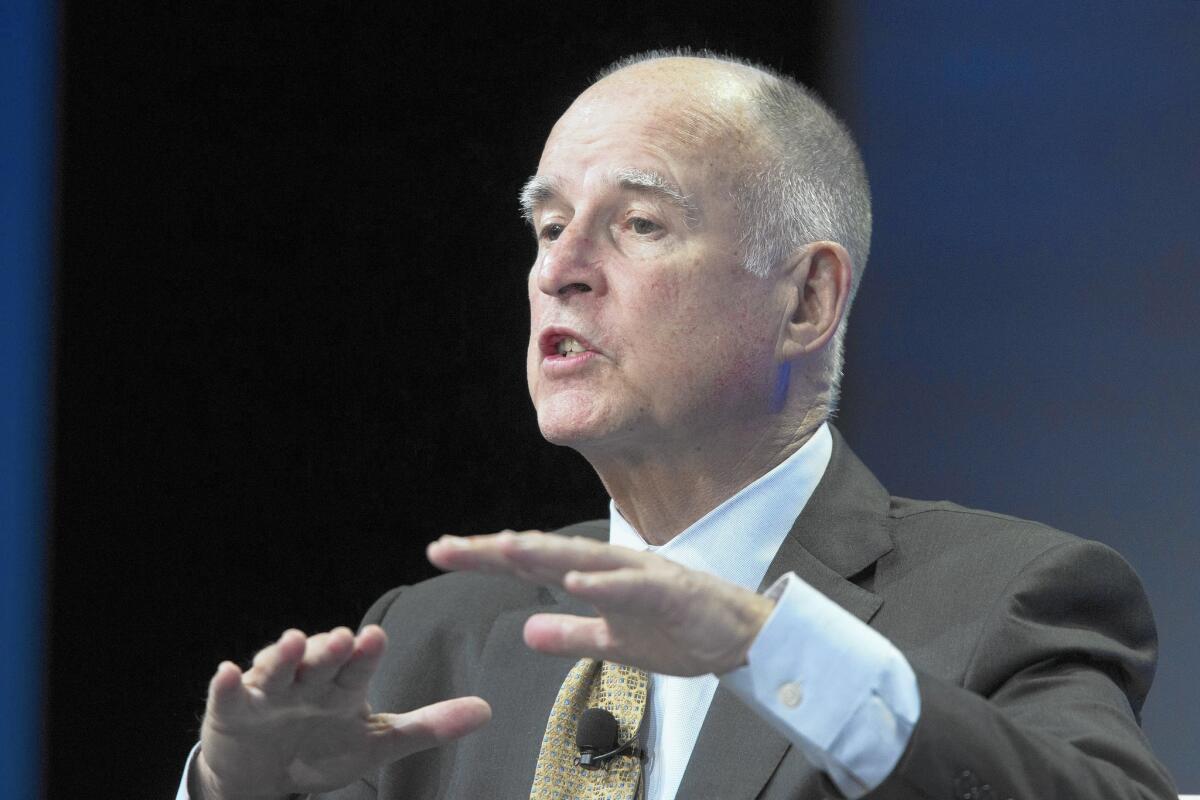Public education stands to benefit most from increased state funds

- Share via
Reporting from SACRAMENTO — As California staggered through years of budget crises, the state law intended to safeguard funds for public education was no defense against a flood of recessionary red ink.
School budgets were cut by billions of dollars, and thousands of teachers were laid off.
So it’s an incredible reversal of fortune that the Capitol is now awash in what one lawmaker described as “98 envy,” a reference to Proposition 98, the decades-old constitutional amendment that guarantees schools a major slice of state revenue.
As Gov. Jerry Brown prepares to release his updated budget proposal Thursday, the funding formula is expected to direct billions of dollars in unexpected revenue to schools and community colleges.
When a final budget is written next month, there could be little money left for expanding other programs, to the chagrin of lawmakers and advocacy groups who say their priorities such as child care and public healthcare for the poor are still underfunded years after the recession ended.
“It’s very hard to understand, and to explain to people on the outside, how it is that the state is getting billions of dollars in new revenue, and there may not be one penny for low-income families,” said Mike Herald, a lobbyist for the Western Center on Law and Poverty.
The situation has placed education advocates in the unusual position of defending a windfall for schools, which are typically a top priority for California voters.
Estelle Lemieux, a lobbyist for the California Teachers Assn., conceded Monday, “We’re going to have a good year.” But she added, “We’re not getting more than we’re supposed to. We’re just getting what’s owed to us.”
Proposition 98 rules are always a crucial budget issue. But how the unexpected money is allocated this year will be particularly contentious as Brown and lawmakers hammer out a final spending plan, due June 15.
“The question of whether all of the state’s revenue growth goes to schools is where the debate lies this year,” said Chris Hoene, executive director of the California Budget & Policy Center, which advocates for low-income families.
Revenue has outpaced projections by about $3 billion, according to legislative analysts, with the potential for even greater gains in the coming months. Because the funding formula forces the state to compensate for cuts in previous years, almost all of it could go to education.
In fact, the law could require funds for schools to grow even faster than revenue, the nonpartisan analysts said, raising the possibility that the state may need to trim spending in other areas.
So Democratic lawmakers are considering ways to tweak the Proposition 98 calculations.
One approach could be changing property tax allocations, putting more local revenue toward schools and freeing up some state money.
There have also been discussions about modifying how early childhood programs are funded, which would force public schools and community colleges to share some of the surplus with child care and preschools.
Such a step is staunchly opposed by a coalition of powerful education groups.
In that case, Lemieux said, “you have the same amount of money with more students to educate or care for.”
Sen. Holly Mitchell (D-Los Angeles), who chairs a budget subcommittee and wants higher spending on social services, said it makes sense for more programs to be funded by Proposition 98.
That’s “where all the action is,” she said.
The disagreements echo the battle in 1988 when Proposition 98 was approved.
The teachers union and its allies wanted to permanently secure a portion of state spending for schools after the property-tax limits of Proposition 13 made it harder to increase revenue at the local level.
They were bitterly opposed by others who feared their piece of the pie would shrink. But after a hard-fought campaign, the measure passed with just more than 50% of the vote.
Since then, Proposition 98 has been a pillar of California’s budget, although it can be — and has been — suspended during economic downturns. But under the law, education goes to the front of the line when revenue bounces back.
“A lot of the health and human services really wish they were as lucky,” said Laphonza Butler, state council president of the Service Employees International Union.
However, she added, “I don’t think there’s any disagreement that investing in our kids should be first.”
The hope among advocates and Democratic lawmakers is that Brown will be receptive enough in budget negotiations to make some new money available for services other than schools.
“The state’s leaders have some choices that would actually allow them some flexibility,” Hoene said. “It isn’t all just a foregone conclusion.”
As the economy has rebounded in recent years, the governor and lawmakers have often found middle ground and allowed limited spending increases outside of education.
Assembly Budget Chairwoman Shirley Weber (D-San Diego) said some “schools rightfully deserve the lion’s share.”
But “there are a number of things still on our plate from last year that we’ll continue to work on,” she said.
[email protected]
Twitter: @chrismegerian
More to Read
Sign up for Essential California
The most important California stories and recommendations in your inbox every morning.
You may occasionally receive promotional content from the Los Angeles Times.











